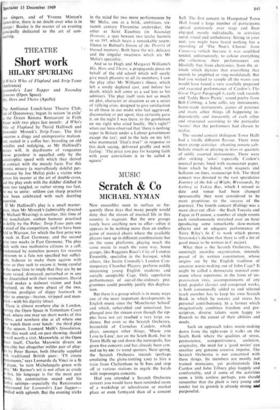MUSIC Scratch & Co
MICHAEL NYMAN
New ensembles seem to surface so fre- quently these days that many people would deny that the stream of musical life in this country is stagnant. But the new groups rarely have anything new to offer—often it appears to be nothing more than an endless game of musical chairs where the available players turn up in different combinations but on the same platforms, playing much the same music in much the same way. Some groups, like Ruggiero Ricci's City of London Ensemble, specialise in the baroque, while others, like Justin Connolly's London Con- temporary Chamber Players, perform mildly interesting young English moderns and socially acceptable Cage. Only superlative performances of out-of-the-ordinary pro- grammes could possibly justify this duplica- tion.
But there is a group which is in many ways one of the most important developments in English music since the 'Manchester School' and which, unheralded and unnoticed, has plunged into the stream even though the rip- ples have not yet reached a very large au- dience. But even so the Scratch Orchestra, brainchild of Cornelius Cardew, which plays, amongst other things, 'Music you Love to Love', not on the South Bank, but in Town Halls up and down the metropolis, has given five concerts and has already been can- ned up by BBC Tv trend spotters. Next spring, the Scratch Orchestra intends (perhaps emulating the globe-trotting Lso) to hire a train from Cheltenham to St Ives and stop off at various stations to regale the locals with impromptu concerts.
Had you attended a Scratch Orchestra concert you would have been reminded more of a workshop or schoolroom or market place or even farmyard than of a concert
hall. The first concert in Hampstead Town Hall found a large number of participants spread generously over stage and floor engaged, mostly individually, in activities aural, visual and ambulatory. Sitting in your seat, you might have heard nothing but a recording of The Nun's Chorus' from Casanova (which because it was amplified tended, unfortunately, to colour everything else -otherwise their performances are blissfully free from electronics, from the at- titude which dictates that everything that sounds be amplified or ring-modulated). But had you wished to sample all the wares you would have found a very carefully prepared and executed performance of Cardew's The Great Digest Paragraph 6, early rock records and 'Teddy Bears Picnic', sound poetry from Bob Cobbing, a lone cello, toy instruments, home-made instruments, games of patience and many other things all happening in- dependently and innocently of each other and structured according to the particular `scores' that the performers had chosen to realise.
The second concert (Islington Town Hall) had a totally different flavour. There were more group activities--chanting remote cab- balistic rituals or playing in trios or quartets of oddly assorted instruments. There were also striking `solos'—especially Cardew's musical ponds, lined with manuscript paper, from which he fished, with magnets and balloons on lines, manuscript fish. The third concert was devoted to the vast speculative Journey of the Isle of Wight, Westwards, by Iceberg to Tokyo Bay, which I missed as date and venue had been changed (presumably they were considered to be more propitious to the success of the journey). The fourth concert (Ealing) was a more clear cut affair—the Bach Toccata and Fugue in D minor, a number of single events each simultaneously stretched over an hour (producing some remarkable slow-motion effects) and an adequate performance of Terry Riley's In C (a work which proves Stravinsky's dictum that there is still a lot of good music to be written in C major).
What then is the Scratch Orchestra, this seemingly anarchic organisation, intensely proud of its written constitution, whose origins arc by the English tradition of amateur music-making out of John Cage? It might be called a democratic musical com- mune whose repertoire, in the form of im- provisation rites, accompaniments of any kind, popular classics and composed works, is both communally added to and selected (each member has to keep his own Scratch Book in which he notates and stores his personal contributions). In a format which imaginatively combines freedom and pre- scription, diverse talents seem happy to flourish to the extent of their abilities and needs.
Such an approach takes music-making down from the tight-rope it walks on the South Bank where the qualities of stress, permanence, competitiveness, ambition, originality, the need for a 'good notice' can smother any genuine creative impulse. The Scratch Orchestra is not concerned with these things. Its members are mostly not trained musicians, yet professionals like Cardew and John Tilbury play happily and comfortably, and if some of the activities seem a little aimless perhaps, you should remember that the plant is very young and tender but its growth is already strong and purposeful.














































 Previous page
Previous page